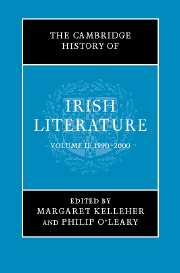Book contents
- Frontmatter
- Introduction
- 1 Literature and politics
- 2 The Irish Renaissance, 1890–1940: poetry in English
- 3 The Irish Renaissance, 1890–1940: prose in English
- 4 The Irish Renaissance, 1890–1940: drama in English
- 5 The Irish Renaissance, 1880–1940: literature in Irish
- 6 Contemporary prose and drama in Irish 1940–2000
- 7 Contemporary poetry in Irish: 1940–2000
- 8 Contemporary poetry in English: 1940–2000
- 9 Contemporary prose in English: 1940–2000
- 10 Contemporary drama in English: 1940–2000
- 11 Cinema and Irish literature
- 12 Literary historiography, 1890–2000
- Afterword: Irish-language literature in the new millennium
- Afterword: Irish literature in English in the new millennium
- Guide to major subject areas
- Index
- References
2 - The Irish Renaissance, 1890–1940: poetry in English
Published online by Cambridge University Press: 28 March 2008
- Frontmatter
- Introduction
- 1 Literature and politics
- 2 The Irish Renaissance, 1890–1940: poetry in English
- 3 The Irish Renaissance, 1890–1940: prose in English
- 4 The Irish Renaissance, 1890–1940: drama in English
- 5 The Irish Renaissance, 1880–1940: literature in Irish
- 6 Contemporary prose and drama in Irish 1940–2000
- 7 Contemporary poetry in Irish: 1940–2000
- 8 Contemporary poetry in English: 1940–2000
- 9 Contemporary prose in English: 1940–2000
- 10 Contemporary drama in English: 1940–2000
- 11 Cinema and Irish literature
- 12 Literary historiography, 1890–2000
- Afterword: Irish-language literature in the new millennium
- Afterword: Irish literature in English in the new millennium
- Guide to major subject areas
- Index
- References
Summary
Introduction
The fifty years from 1890 to 1940 are at once among the most distinguished and the most problematic in the development of Irish poetry in English. They encompass the steadily incremental and ultimately magisterial career of W. B. Yeats, who, besides being the country’s first indisputably great Anglophone poet, was a writer of ampler gifts and resourcefulness than any produced by the island’s Gaelic tradition since Dáibhí Ó Bruadair. Yeats is as central as Shelley or Tennyson to the history of what used to be called English literature, yet the matter of Ireland is at the core of his themes and figuration, while the manner of Ireland is to varying degrees audible in his idiom. These same years, however, were characterised also by the activities of a range of lesser poets, many of them notably popular in their day, to whose work it is now difficult to respond except in terms of its period interest. One of the problems with Dora Sigerson Shorter, James Stephens, F. R. Higgins and many of the other writers who appear, from our contemporary perspective, to bob in Yeats’s wash is that their very success in affecting the manner and/or pursuing the matter of Ireland cut them off from wider concerns. Some of these poets spent more time out of the country than Yeats did, but at best they only intermittently managed to accommodate the broader challenges of modernity in their verse.
Europe underwent tumultuous change in the half-century from the fall of Parnell to the fall of France.
- Type
- Chapter
- Information
- The Cambridge History of Irish Literature , pp. 50 - 112Publisher: Cambridge University PressPrint publication year: 2006



